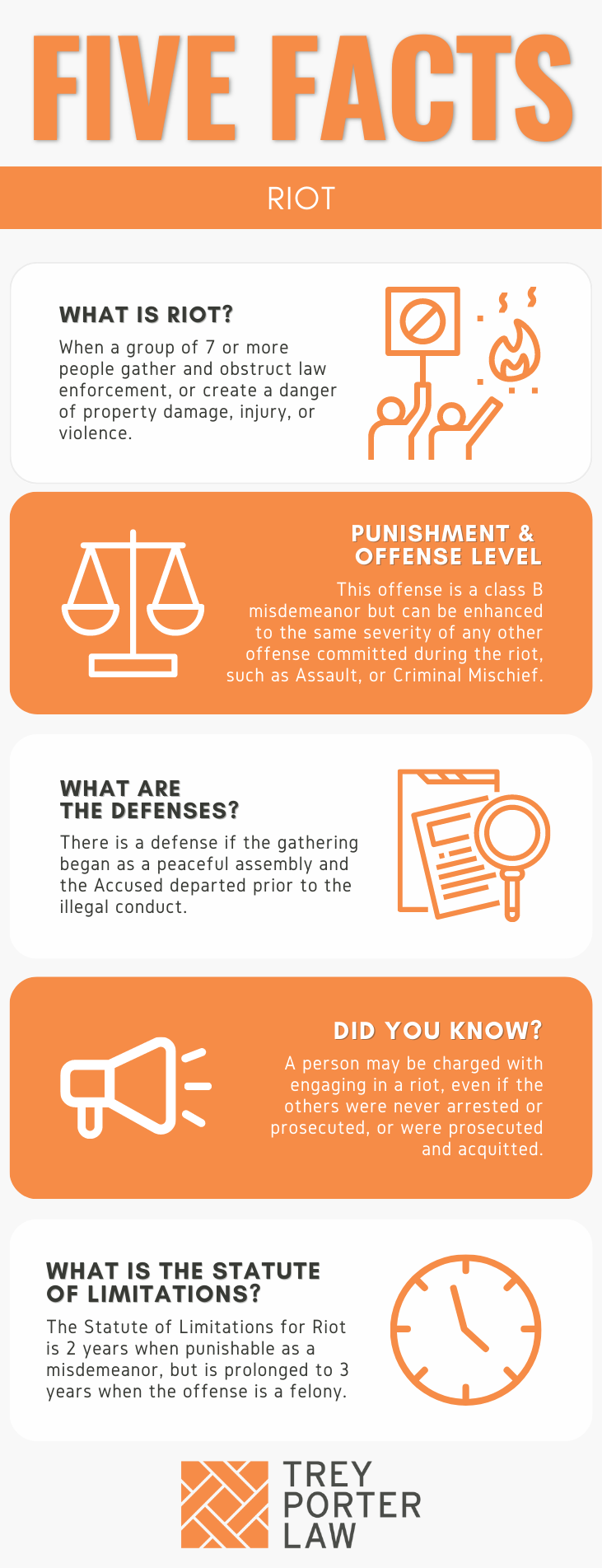WHAT IS RIOT IN TEXAS?
Texas law prohibits participating in a riot, which is a group of seven or more people who obstruct law enforcement, or create an immediate danger of property damage, injury, or violence to others.
WHAT IS THE RIOT LAW IN TEXAS?
Tex. Penal Code § 42.02. RIOT.
(b) A person commits an offense if he knowingly participates in a riot.
(c) It is a defense to prosecution under this section that the assembly was at first lawful and when one of those assembled manifested an intent to engage in conduct enumerated in Subsection (a), the actor retired from the assembly.
(d) It is no defense to prosecution under this section that another who was a party to the riot has been acquitted, has not been arrested, prosecuted, or convicted, has been convicted of a different offense or of a different type or class of offense, or is immune from prosecution.
(e) Except as provided in Subsection (f), an offense under this section is a Class B misdemeanor.
(f) An offense under this section is an offense of the same classification as any offense of a higher grade committed by anyone engaged in the riot if the offense was:
(1) in the furtherance of the purpose of the assembly; or
(2) an offense which should have been anticipated as a result of the assembly.
WHAT IS THE PENALTY CLASS FOR RIOT IN TEXAS?
If no other offenses are committed by anyone who participated in the riot, mere participation is a Class B misdemeanor, punishable by up to 180 days in county jail. If anyone participating in the riot commits a foreseeable offense in furtherance of the riot, the riot charge will be classified as the offense of the highest penalty category committed.
WHAT IS THE PUNISHMENT RANGE FOR RIOT IN TEXAS?
The punishment range for engaging in a riot charged as a Class B misdemeanor is up to 180 days, and a maximum fine of $2,000. Rioting charged as a higher grade will have the same punishment range as the other offense committed. The possible punishment ranges include:
- Class A misdemeanor: up to one year in jail, and a maximum fine of $4,000;
- State jail felony: 180 days to two years in a state jail facility, and a maximum fine of $10,000;
- Third degree felony: two to ten years in prison, and a maximum fine of $10,000;
- Second degree felony: two to 20 years in prison, and a maximum fine of $10,000;
- First degree felony: five to 99 years or life in prison, and a maximum fine of $10,000.
WHAT ARE THE PENALTIES FOR RIOT IN TEXAS?
A person charged with riot may be eligible for probation after a conviction, or deferred adjudication without a conviction. Community supervision for a misdemeanor offense may not exceed two years. If engaging in a riot is classified as a state jail felony, the supervision term may be between two and five years, with the possibility of extending supervision for up to ten years. The community supervision period for second degree and third degree felony riot charges will range between two and ten years, and between five and ten years for a first degree felony.
WHAT ARE THE DEFENSES TO RIOT IN TEXAS?
The riot statute creates a defense if the assembly began as lawful. A person accused of rioting may defend himself or herself by showing the assembly was lawful at first, and the accused left the assembly once the illegal conduct began.
However, the statute also warns it is no defense if other participants were acquitted, or not charged at all. This means one person may be charged with engaging in a riot, even if others were never arrested or prosecuted, or were prosecuted and acquitted.
WHAT IS THE STATUTE OF LIMITATIONS FOR RIOT IN TEXAS?
The limitation period for participating in a riot, if chargeable as a misdemeanor, is two years. Riot classified as a felony has a three-year limitation period.
RIOT IN TEXAS
The law against rioting in Texas exposes a person to punishment for the foreseeable conduct of all participants. If seven or more people assemble, and commit acts of violence, property damage, or obstruct law enforcement or other government functions, everyone may be charged with engaging in a riot.













